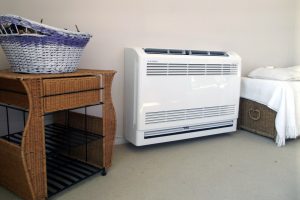As summer temperatures rise, ensuring your heat pump is operating efficiently becomes crucial for maintaining a comfortable home environment. Heat pumps are designed to both heat and cool your home, but they can encounter specific issues during the hotter months. In this FAQ, we address some of the most common questions and problems related to heat pumps in the summer.
Just remember to schedule heat pump service in Peyton with our team if it’s necessary.
1. How Does a Heat Pump Work in the Summer?
Answer: During the summer, a heat pump operates as an air conditioner. It absorbs heat from inside your home and releases it outside, thereby cooling your living spaces. This process is facilitated by the refrigerant that circulates through the system, transferring heat effectively.
2. Why Is My Heat Pump Blowing Warm Air?
Answer: If your heat pump is blowing warm air instead of cool, there could be several reasons:
- Refrigerant Issues: Low refrigerant levels or leaks can cause the system to malfunction.
- Thermostat Problems: Incorrect thermostat settings or a faulty thermostat can lead to improper cooling.
- Dirty Coils or Filters: Accumulated dirt and debris can restrict airflow, reducing the cooling efficiency.
3. What Should I Do If My Heat Pump Is Short Cycling?
Answer: Short cycling, where the heat pump frequently turns on and off, can be caused by:
- Thermostat Issues: Incorrect thermostat placement or settings can lead to short cycling.
- Over-sized Unit: An over-sized heat pump can cool the area too quickly, causing it to shut off prematurely.
- Electrical Problems: Faulty wiring or electrical components can disrupt the normal cycling process.
To address short cycling, check the thermostat settings and placement, and consider having a professional inspect the unit to ensure it is appropriately sized and free of electrical issues.
4. How Can I Improve the Efficiency of My Heat Pump in the Summer?
Answer: Improving your heat pump’s efficiency can help reduce energy costs and enhance comfort:
- Regular Maintenance: Schedule regular maintenance to clean coils, replace filters, and check refrigerant levels.
- Proper Insulation: Ensure your home is well-insulated to prevent cool air from escaping.
- Shade and Ventilation: Provide shade for the outdoor unit and ensure proper ventilation to improve efficiency.
5. Why Is My Heat Pump Making Strange Noises?
Answer: Unusual noises from your heat pump can indicate various issues:
- Grinding or Squealing: This may signal motor or fan problems, often requiring lubrication or replacement.
- Rattling: Loose components or debris in the unit can cause rattling sounds.
- Hissing or Bubbling: These sounds often indicate refrigerant leaks.
If you hear strange noises, it’s best to turn off the unit and contact a professional to diagnose and fix the problem.
6. How Often Should I Schedule Professional Maintenance?
Answer: Ideally, professional maintenance should be scheduled twice a year—once in the spring and once in the fall. Regular maintenance helps identify potential issues early, ensuring your heat pump operates efficiently throughout the year.
7. Can a Heat Pump Handle Extreme Summer Temperatures?
Answer: Modern heat pumps are designed to handle a wide range of temperatures. However, in extreme heat, they may struggle to maintain optimal cooling. Ensuring your system is well-maintained, adequately sized, and supported by good insulation can help it cope better with extreme summer temperatures.
You can always count on SoCo Heating and Cooling to provide you with fast and effective heat pump repairs. So Cool, So Cozy.

